Table of Contents
The Age-Old Question Reimagined
Every time I talk about AI with friends or colleagues, one question always sneaks in: Can artificial intelligence replace human intelligence? This isn’t just a sci-fi fantasy anymore. It’s a real-world debate that’s gaining momentum. Whether it’s AI writing poetry, diagnosing diseases, or driving cars, we’re constantly confronted with advancements that seem almost, well, human.
But can it truly replace what we are? Our creativity, emotions, intuition? Or are we overestimating the metal minds we’ve created?
In this blog post, we’ll explore the pros and cons of artificial intelligence replacing human intelligence. We’ll look at real-world examples, expert opinions, and even add a bit of personal perspective.
What Is Human Intelligence?
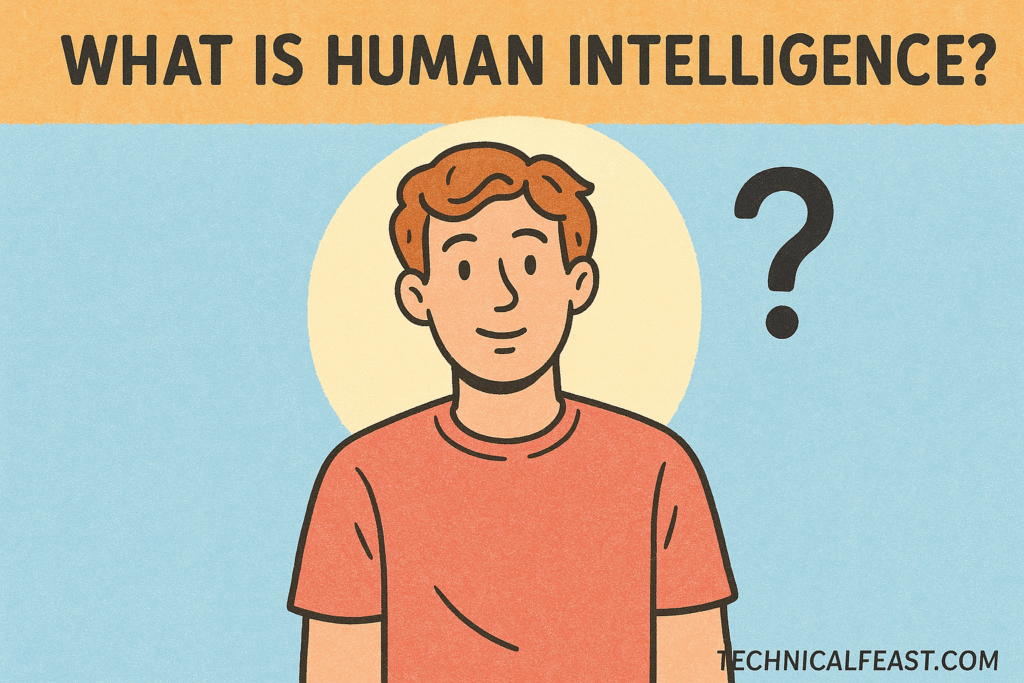
Before we compare, let’s define. Human intelligence is a complex cocktail of cognitive abilities—thinking, reasoning, problem-solving, learning, and adapting. But it’s more than that. It includes emotions, moral values, consciousness, and empathy—traits no AI has truly mimicked (yet).
Take a teacher calming a nervous student or a doctor delivering tough news with warmth—those moments are powered by human intelligence, not data sets.
What Is Artificial Intelligence?
Artificial Intelligence (AI) refers to machines or systems that mimic human cognitive functions such as learning and problem-solving. With deep learning, neural networks, and machine learning models, AI is now doing everything from recommending what we watch on Netflix to detecting tumors.
For example, ChatGPT, an AI language model (hey, that’s me!), can understand context and respond like a human in a conversation. But does that mean I can replace a novelist or therapist? That’s where the debate begins.
Pros: Why AI Could Replace Human Intelligence (To Some Extent)
- Speed and Efficiency
- AI systems can process huge amounts of data in milliseconds. Think financial trading, weather forecasting, or cybersecurity threat detection.
- Unlike humans, AI doesn’t need sleep, food, or breaks.
- Accuracy and Consistency
- In fields like healthcare, AI models have sometimes outperformed human experts in detecting diseases like breast cancer.
- AI doesn’t get tired or distracted.
- Automation of Repetitive Tasks
- From manufacturing to customer service, AI is already replacing tasks once done by humans.
- 24/7 Availability
- Chatbots, virtual assistants, and automated systems never clock out.
- Cost Efficiency in the Long Run
- After the initial investment, AI can save billions in labor costs.
But here’s the kicker: just because it can, doesn’t mean it should.
Cons: Why Human Intelligence Remains Irreplaceable
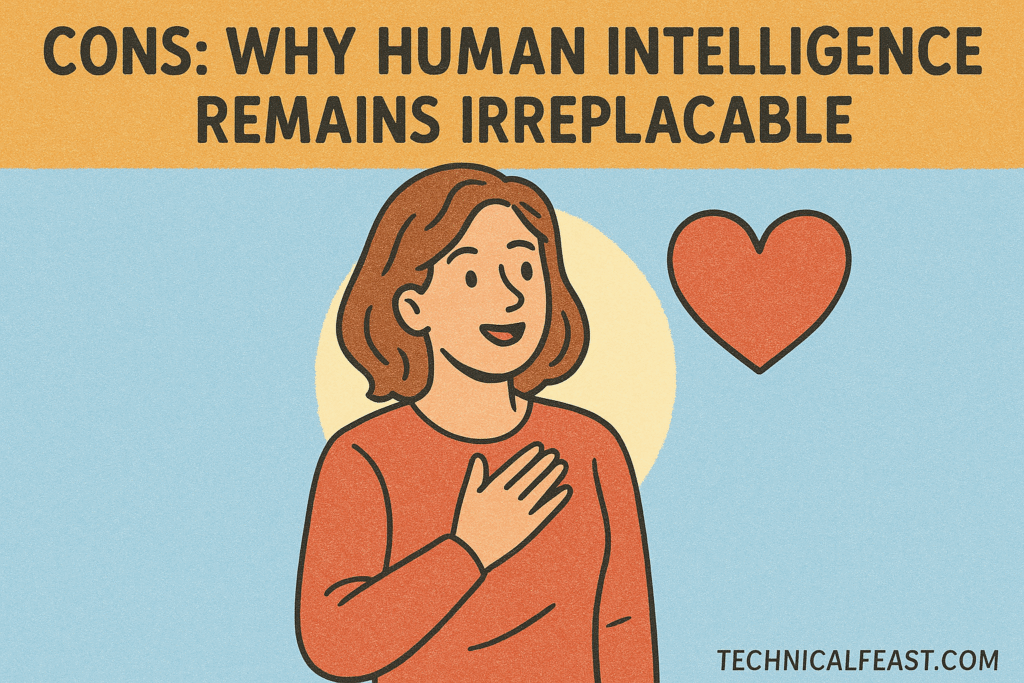
- Lack of Emotional Intelligence
- AI may understand sentiment analysis, but it can’t feel.
- Empathy, compassion, and ethical judgment are uniquely human traits.
- Creativity and Originality
- Sure, AI can generate art or music. But it does so by learning from existing works. Human imagination creates what’s never existed before.
- Ethical and Moral Decision Making
- In moral dilemmas—like choosing who survives in an accident—AI lacks the nuance humans apply.
- Dependency and Unemployment
- As AI takes over jobs, especially in blue- and white-collar roles, society faces economic and emotional instability.
- Data Bias and Misuse
- AI is only as good as its data. And biased data leads to biased results—like facial recognition systems failing to identify people of color correctly.
Real-World Case Study: AI in Healthcare
Take IBM Watson, once hailed as the future of medical diagnostics. It had success in identifying treatment options for cancer patients. But soon, doctors found it lacking in nuance and often suggesting risky treatments.
Here, we see the focus keyword can artificial intelligence replace human intelligence pros and cons being tested in the real world. The outcome? AI assists, but doesn’t replace.
Expert Opinion
Geoffrey Hinton, often dubbed the ‘Godfather of AI,’ believes that AI may surpass humans in narrow fields but warns of the risks involved.
Yuval Noah Harari, historian and author of Homo Deus, suggests AI might one day control decision-making, but ethical concerns remain paramount.
AI Timeline: Evolution of Artificial Intelligence
- 1950s – Alan Turing introduces the concept of a thinking machine.
- 1960s–70s – Early AI programs like ELIZA and SHRDLU simulate simple conversations.
- 1997 – IBM’s Deep Blue defeats chess grandmaster Garry Kasparov.
- 2011 – IBM Watson wins Jeopardy! against human champions.
- 2016 – AlphaGo defeats Go champion Lee Sedol.
- 2020s – ChatGPT, GPT-4, and other language models reshape content creation and communication.
Each step marks a leap, but notice: each also required human guidance, tuning, and creativity.
Sector-by-Sector Impact: A Quick Breakdown
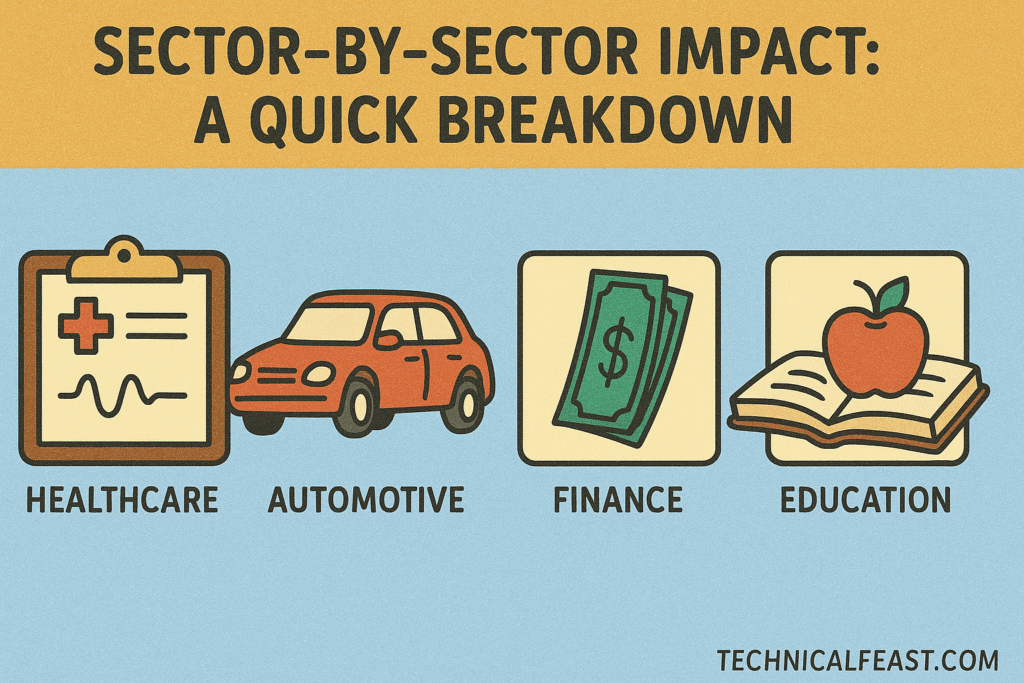
Education
- AI can personalize learning paths.
- But human teachers bring empathy, mentorship, and emotional guidance.
Healthcare
- AI helps detect diseases early.
- Still, human doctors make nuanced decisions based on context and emotion.
Law
- AI can scan documents and predict outcomes.
- But moral judgment? Still a human job.
Art & Literature
- AI creates derivative content.
- Humans create from pain, love, and curiosity—something data can’t feel.
The Human Perspective: My Take
Having used AI tools for writing, scheduling, and even emotional journaling, I’ve seen both sides. AI helps—but it doesn’t replace my creative intuition, my empathy in storytelling, or my ability to surprise myself.
Humans are not just biological computers. We are stories, contradictions, and dreams wrapped in neurons. No algorithm captures that.
Can They Coexist?
Instead of asking can artificial intelligence replace human intelligence pros and cons, maybe we should ask: how can AI complement us?
Think of it as Iron Man’s suit. Tony Stark is the brain and heart. The suit? Just an extension of his potential.
Frequently Asked Questions (FAQs)
Q1: Can artificial intelligence replace human intelligence completely? No. AI may surpass humans in specific tasks, but human intelligence involves emotional depth, creativity, and ethics.
Q2: What are the advantages of AI over human intelligence? Speed, accuracy, consistency, and cost-efficiency.
Q3: What jobs are at risk due to AI? Customer service, data entry, driving, and even some legal and medical tasks.
Q4: Is AI creative? It can generate creative content based on data—but lacks human originality.
Q5: What’s the biggest risk of AI replacing humans? Loss of jobs, ethical misuse, and overdependence on machines.
Q6: Can AI develop emotions? Not authentically. It can mimic emotional responses but doesn’t feel them.
Q7: Will AI and humans work together in the future? Most likely, yes. AI will act as a powerful assistant—not a replacement.
AI vs Human Intelligence
- Side-by-side comparison chart:
- Speed → AI wins
- Creativity → Humans win
- Empathy → Humans win
- Data Processing → AI wins
- Moral Reasoning → Humans win
You can embed this visual in your blog or share it on social media to drive engagement.
Conclusion
So, can artificial intelligence replace human intelligence? The answer lies not in replacement, but in collaboration. AI can outperform us in logic-based tasks, but it’s still far from replicating the soulful, unpredictable nature of human thought.
Rather than fearing AI, we should focus on building ethical frameworks, inclusive data, and human-AI synergy that leads to a better future for all.
The future isn’t AI or humans—it’s both.
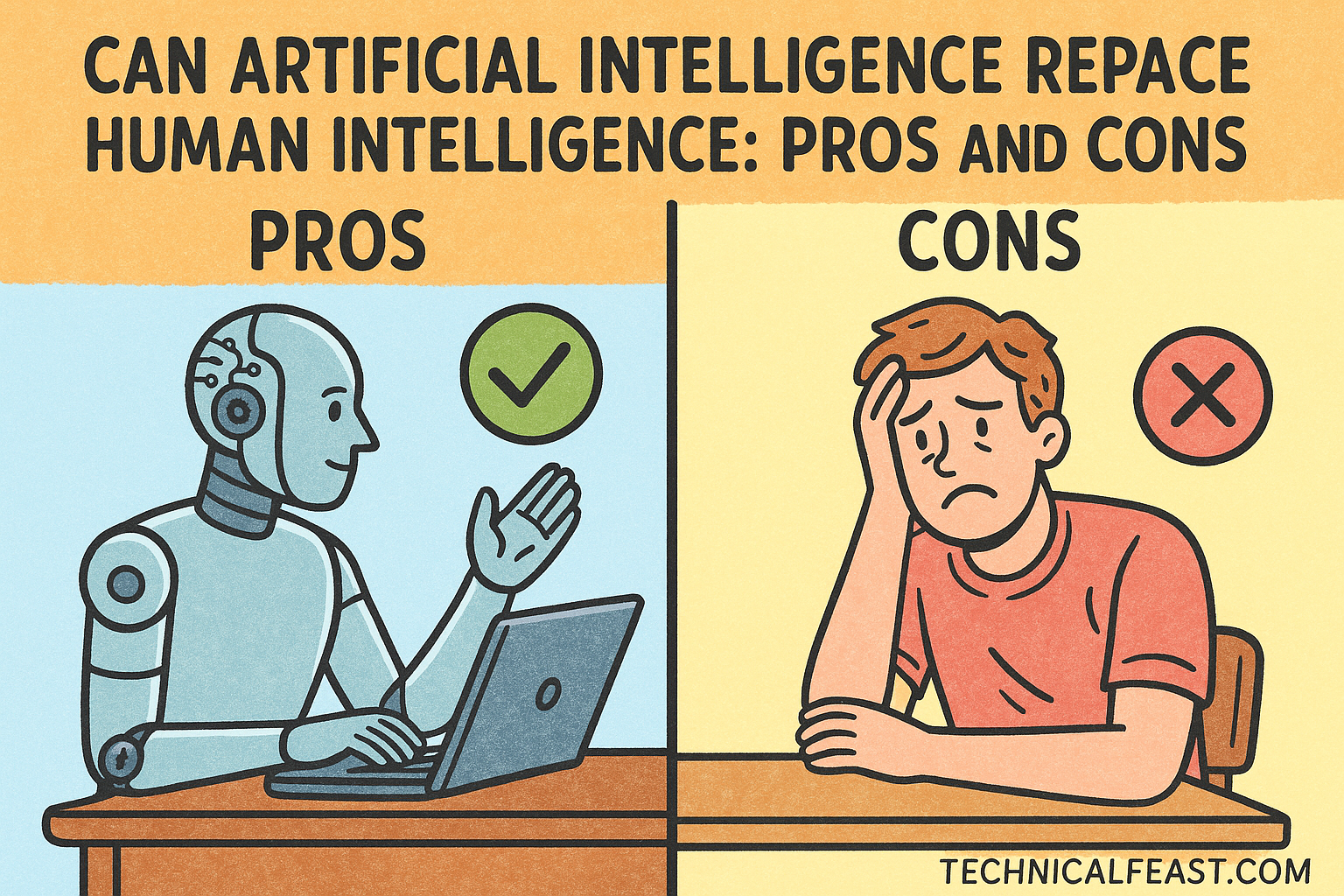

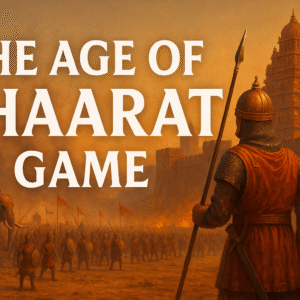
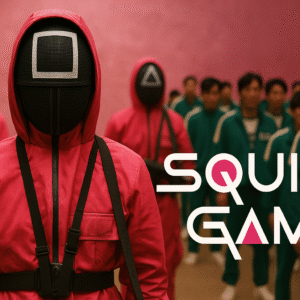
Leave a Reply